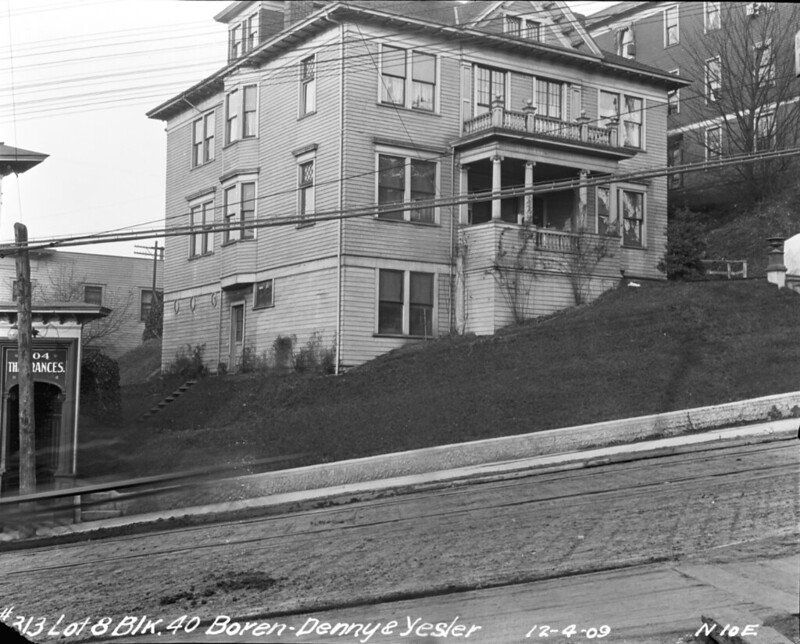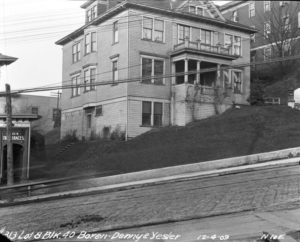

Washington’s new bill will “increase housing unit inventory by removing arbitrary limits on housing options.” In plain English, what that means is that groups of people who aren’t family will be allowed to live together. Washington is one of many states with old laws on the books prohibiting such living arrangements — a vestige of zoning regulations aimed at prioritizing the nuclear family and limiting the availability of affordable housing through boarding houses. In their zeal, however, such laws put an end to a useful urban housing model: affordable dwellings shared by strangers, a form that’s perfect for today’s housing-stressed cities.
This is from Diana Lind, “A Centuries Old Idea That’s Making Cities More Affordable Today,” June 11, 2021. HT2 Tyler Cowen. The Washington referred to above is Washington state.
Later she writes:
Boarding houses and SROs [single room occupancy] used to be very common in the United States. In the 1800s an estimated one-third to one-half of urban residents either hosted boarders or were boarders themselves. This style of housing accommodated a quadrupling of the American population over the 19th century, and enabled people to live affordably enough in walking distance of daily needs and amenities.
But throughout the second half of the 20th century, these housing types gradually disappeared as a result of zoning that prioritized single-family housing, and explicitly made these housing types illegal. While racist practices like redlining prevented people of color from buying homes in white neighborhoods, policies banning group living were likewise intended to keep white, single-family neighborhoods out of reach of certain groups: people of color, lower-income extended families, groups of friends, or single laborers. It didn’t help that the only SROs or boarding houses that continued to operate were often in disinvested urban areas.
I had experience with both SROs and boarding houses in the early 1970s, both quite positive.
In late May 1970, after graduating from the University of Winnipeg, I hitchhiked from Winnipeg across Canada to Vancouver and down to Los Angeles, stopping along the way to visit existing friends and new friends. (One of my friends called this my “libertarian pilgrimage.”) The new friends tended to be libertarians I had heard about or read. In San Francisco I didn’t know anyone and I thought that asking one libertarian woman I met if I could sleep on her couch was too forward. So I found a divey San Francisco hotel and paid $5 or $6 a night for my own room without a bathroom: the bathroom was a shared facility down the hall. I did the same in Los Angeles.
In the summer of 1973, after I had spent one year in the Ph.D. program at UCLA, I was a summer intern in Nixon’s Council of Economic Advisers, working under Herb Stein. I wanted to save as much money as I could to help pay for living expenses at UCLA. I had heard about a Harvard undergrad named Larry Siskind who was heading something called the “Libertarian Task Force.” He, the people who worked under him, and a few other libertarians and conservatives (one worked as an intern for columnist Jack Anderson and one worked in Vice-President Agnew’s office) were renting a divey house on East Capitol Street. I asked if I could join them and pay a modest rent. Larry accepted and I shared a room with a guy named Steve Beckner. It was cheap housing and lots of fun.
Allowing such housing would help a lot of people who want to move to a city and take a new job.

READER COMMENTS
Dylan
Jun 25 2021 at 8:19am
I’d have to dig in deeper to understand the Washington law, but if there was a law against living with strangers or non-relatives, it certainly didn’t seem to be enforced. In college, a good friend rented an entire old boarding house and then sublet individual rooms. I believe they had 8 people total staying there most of the time. Another friend’s parents ran a boarding house in Washington State until they retired a couple of years ago.
My one experience with an old boarding house was when I was driving through the U.S. 20 years ago. I was in Vermont and found a place listed in a hostel guide. It was obvious that at some point it had been an elegant hotel and then likely converted into a boarding house in the 30s. It was quite run down when I stayed there and felt more like a halfway house than a student hostel. I shared a room with one older man who I think had been living there for sometime. There was a sink in the room and a bathroom down the hall for the floor.
As an aside, can someone explain to me the economics of living in a motel? On a recent road trip we stayed one night in a pretty divey EconoLodge in Ohio and there were several families that were living there. We paid around $70 for one night, even figuring for a hefty discount for long-term stays, that seems like it would be a lot more expensive monthly than an apartment or house. How does that make sense? Is it a credit check situation where they can’t qualify for less expensive housing?
John hare
Jun 25 2021 at 1:57pm
Motels weekly rates can be a way for the owners To clear more profit. No need for a housekeeper staff capable of handling all the rooms even when running partially full. More reliable income from long term. And often a higher occupancy rate. If nightly rates are $70.00, then $250.00 a week is a bit over half which is a win if nightly occupancy is less than half on average. Throwing in the smaller staff and less average hassle and it may well be more profitable than 70-80% nightly occupancy
On the customer side, they don’t have deposits or utilities. They are usually week to week so they don’t have to plan ahead. And they can pick up and go with no notices. A lot of people have real trouble coming up with all the deposits and paperwork to get into a regular apartment.
Patrick
Jun 25 2021 at 3:25pm
This is my experience as well on the enforcement front. As a matter of fact, I did an internship in Olympia, WA working for the state government a few summers ago. When the legislative session ends a LOT of aides, state employees, etc. get out of dodge for vacation. As a result, there is a large list of available rooms/apartments for sublet circulated by state employees. I took advantage of it to find a room for the summer.
Comments are closed.